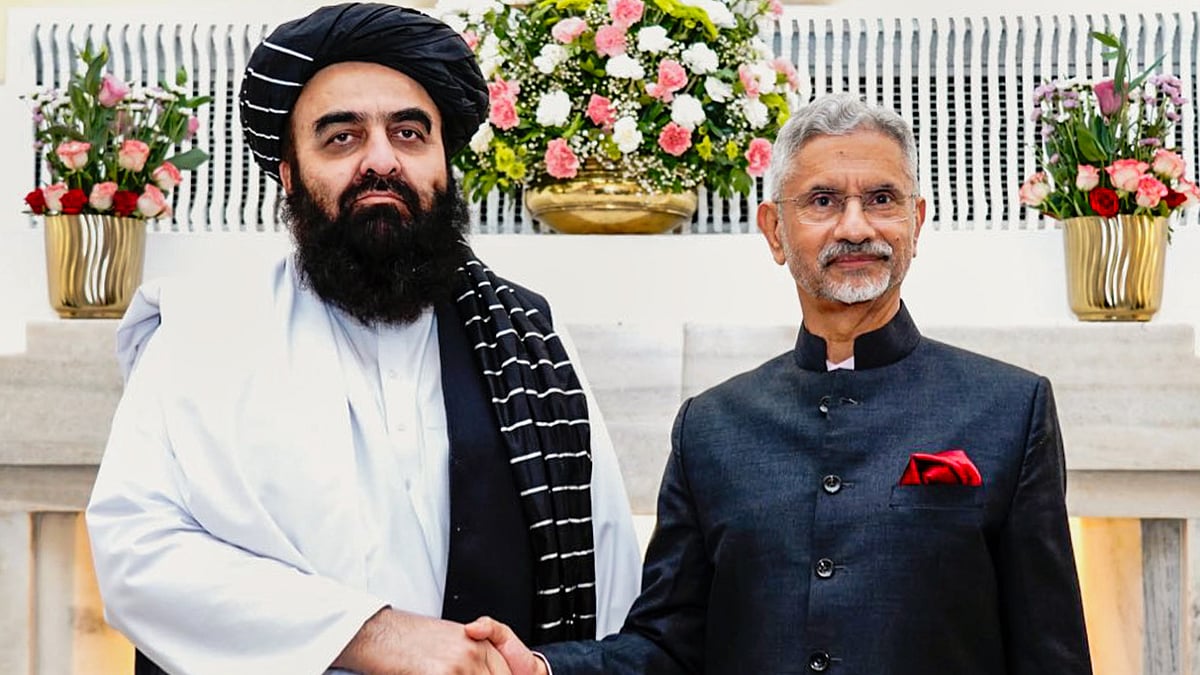Nation
Unintentional, claims Taliban to criticism for keeping women journos out in Delhi
Backlash mounts to visiting Taliban minister Amir Khan Muttaqi’s team keeping women out of his press conference in Delhi

Amir Khan Muttaqi has been on the UN’s list of terrorists since 2001 and is believed to have been part of several attacks on Indian missions until 2021, when the Taliban took control of Afghanistan. India is yet to recognise the Taliban government in Afghanistan but nevertheless rolled out the red carpet for him this week.
The ministry of external affairs and the Government of India were also quick to claim that they had no role to play in keeping out women correspondents from the press conference addressed by Muttaqi at the Afghan embassy in Delhi on Friday, 10 October.
While Taliban’s regressive views on women are well known, what if the late Sushama Swaraj or any other woman had been foreign minister of India? Would the Taliban have refused to meet her or demanded that she first put on a hijab?
In an X post, The Hindu's diplomatic affairs editor Suhasini Haidar on Saturday attached a photograph of the meeting in Hyderabad House between Muttaqi and India’s external affairs minister S. Jaishankar. “Significantly...can see no women in any of the photographs at the Muttaqi-Jaishankar meeting at Hyderabad House either…,” she wrote.
Haidar's flagging the conspicuous absence of any woman at the meeting is significant since India does have a number of women diplomats who have worked in Kabul and in the Indian Technical Mission there.
What sources in the MEA did not say was whether it facilitated the Taliban in holding the press conference at the Afghan embassy, which is still under the control of diplomats appointed by the previous government of the ‘Republic of Afghanistan’, the flag of which continues to flutter at the main gate.
Published: undefined
The MEA also has not elaborated if it has lodged a protest with the Taliban and impressed upon them that in this country, discrimination against women is unlawful and unacceptable.
In a damage-control exercise on Saturday, a Taliban spokesperson was quoted by News18 as saying that keeping women correspondents out of the press conference was ‘unintentional’. He also claimed that foreign minister Muttaqi regularly met women journalists from abroad in Kabul though they have to maintain a strict dress code.
The Taliban, according to UN reports, has kept women out of higher education and from leadership roles. Girls are allowed to study only up to the sixth grade. While women are permitted to run businesses at home like carpet weaving, they are disallowed access to finance or marketing.
Under Taliban rule, no woman is in a leadership role in government, and women are not allowed to work for NGOs. Maternal mortality has increased, and cases of early childbirth have been on the rise. Women are regularly flogged in public as punishment for alleged adultery or not carrying out orders from men, the reports have indicated. So, the decision by the official hosts to keep women correspondents out of the press conference has not come as a total surprise.
Published: undefined
While the MEA sought to distance itself from the press conference, reports suggest it was the MEA which leaned on the charge d’affaires at the Afghan embassy to let the press conference be held there. Significantly, it is the flag of the Islamic Republic of Afghanistan which flies at the embassy, not the flag of the ‘Islamic Emirate of Afghanistan’ as Taliban describes it.
Afghans who work at the embassy told the media, according to multiple reports, that they wanted the press conference to be shifted to a five-star hotel but the MEA turned down the suggestion. Clearly, the Indian government exercises considerable influence and possibly clandestinely funds the operations of the embassy.
Not only has India turned a blind eye to the Taliban’s treatment of women, who comprise half the population of Afghanistan, but it has also overlooked the Taliban’s treatment of its minorities, including Sikhs, Hindus and Hazaras. India has also abandoned the Resistance Front of the late Ahmed Shah Massoud, the rebel who was courted by New Delhi once.
It seems a matter of time before India officially recognises the Taliban government in Kabul, recognised so far only by Russia. Indian foreign policy experts believe it is in India’s strategic interest to court the Taliban.
The strained relations between the Taliban and Pakistan are an added reason for India to cultivate the present rulers in Kabul.
Published: undefined
Follow us on: Facebook, Twitter, Google News, Instagram
Join our official telegram channel (@nationalherald) and stay updated with the latest headlines
Published: undefined